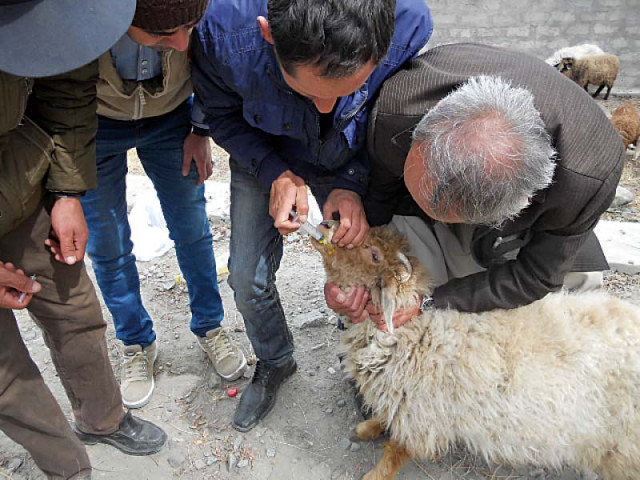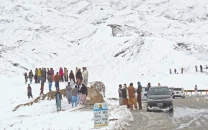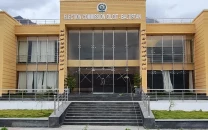SLF trains G-B residents to better care for livestock
Locals shown how to reduce animal deaths by early detection, treatment of diseases

A vet shows how to administer medicine to sheep. PHOTO: SHABBIR MIR/Express
In the last attack, a wild cat had allegedly killed around a dozen goats and sheep in the Misgar area of Gojal valley. Moreover, lack of local knowledge about livestock diseases, examination, and treatment techniques also contribute heavily to economic losses.
The Snow Leopard Foundation (SLF) in partnership with Livestock and Dairy Development Department of G-B, conducted a training this week, for communities in Hunza and Gojal valleys.
“The purpose of this training was to enhance capacity in traditional livestock management system through education on husbandry and livestock health issues in G-B,” SLF communication expert Moiz Rafi said on Thursday.
“This would help communities minimise losses to their livestock caused by diseases,” Rafi told The Express Tribune.
He added that the training was part of a programme on “Snow Leopard Friendly Livestock Vaccination,” which aims to reduce livestock mortality due to diseases, improve the productivity of the stock, and provide indirect compensation to the predation affected families.
Participants of this training were trained to identify unhealthy animals, causes and transmission of diseases, means of transmission, disease prevention and control, examination and treatment techniques. Apart from academic knowledge, techniques to prevent livestock diseases were also demonstrated to teach participant. It included treatment for metabolic, bacterial, viral and parasitic.
Techniques to find the factors, clinical signs, treatment and prevention through vaccination in livestock, animal feeding and housing management practices, and precautionary measures of vaccination were also explained. In addition to this, participants were given the insight to handle drugs (types of medicines, their uses, differences in concentration, and duration of activity).
The use and handling of the thermometer, vaccine handling, vaccination through multiple injection modes, drenching, and vaccine administration were also part of the training programme through theory and practicals. Education on animal feeding and feed improvement (Silage and Urea Straw treatment, etc.) and knowhow of collection and management of vaccination data was also provided to participants by SLF staff.
Published in The Express Tribune, March 31st, 2017.


















COMMENTS
Comments are moderated and generally will be posted if they are on-topic and not abusive.
For more information, please see our Comments FAQ